#mr blanche?
Text
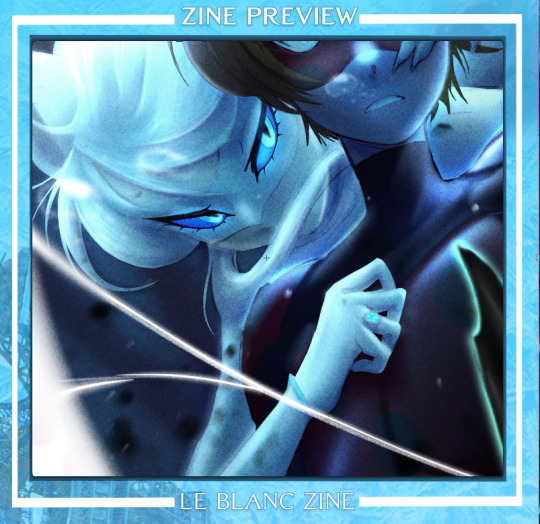
it is no longer my birthday but I still implore you to go take a look at the @leblanczine so heres a small preview of my piece
#miraculous ladybug#miraculous fanart#marinette dupain cheng#ladybug#adrien agreste#chat noir#chat blanc#lady blanche#lady noire#kwami swap#mister bug#whats the shipname-#mr blanche?#love square#tagging the whole love square makes sense with my final piece I prommy
262 notes
·
View notes
Text

A man with an evil mind
Who knows what you are
#artists on tumblr#oc#oc artwork#original work#oc stuff#original character#OC carte Blanche#Mr. Rose#OC Mr. Rose#mafia#50s
1K notes
·
View notes
Text
Mr. Rochester when Jane leaves the party he specifically organized to make her jealous

564 notes
·
View notes
Text
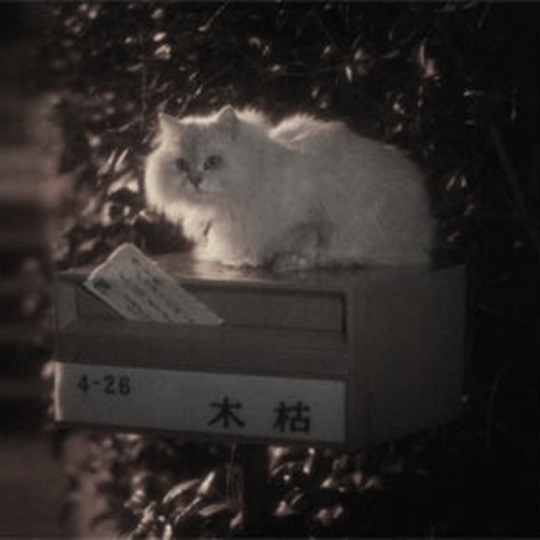
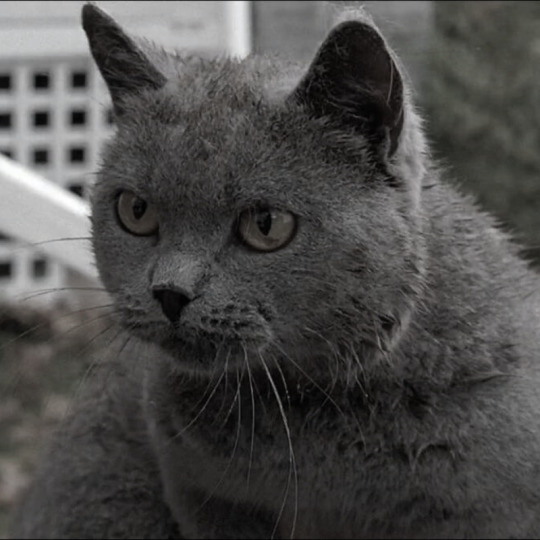
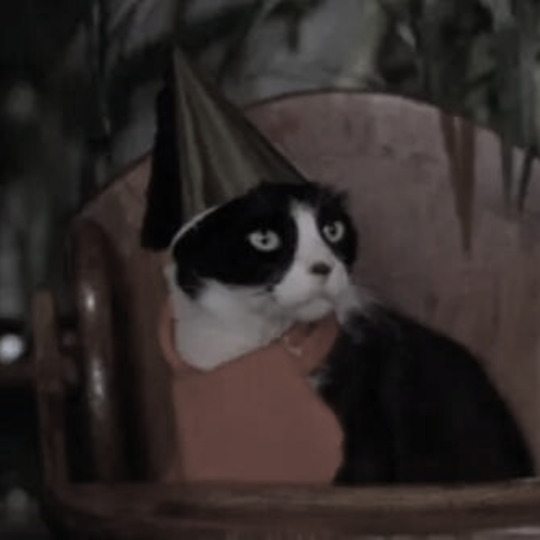
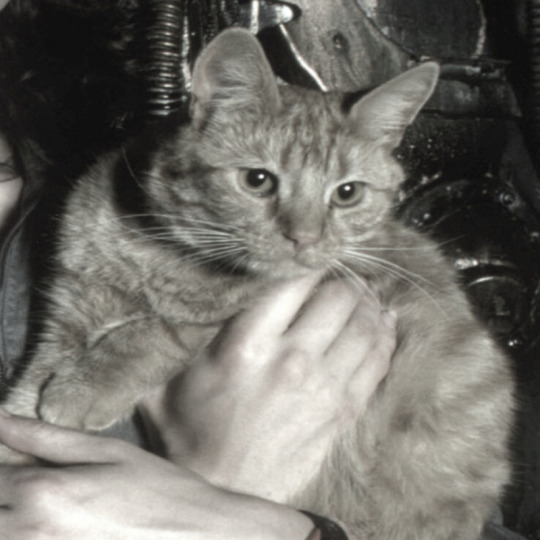

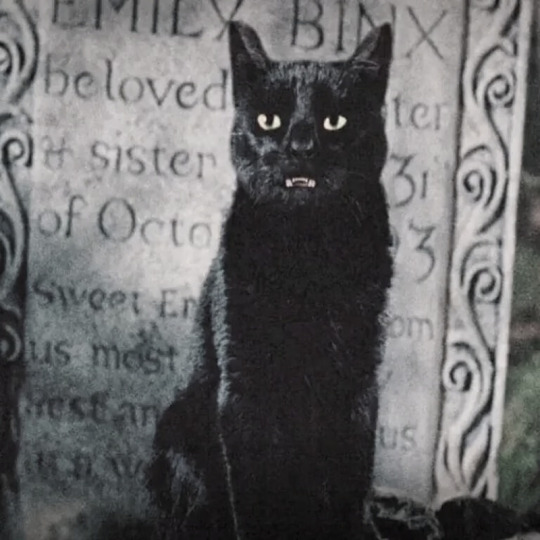
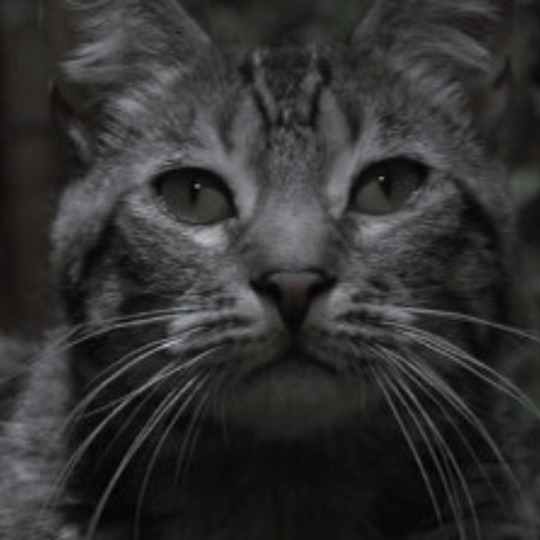


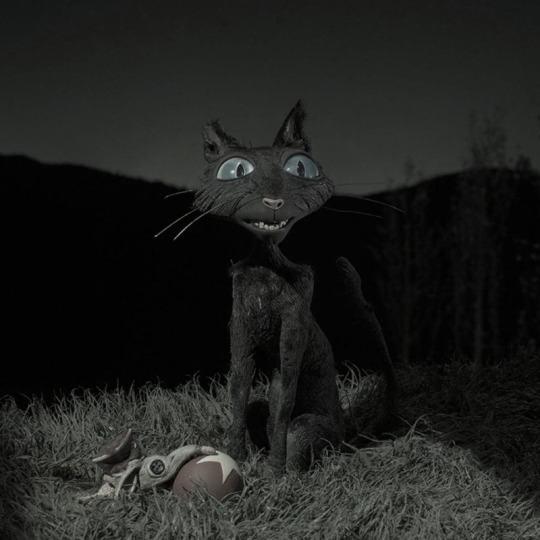
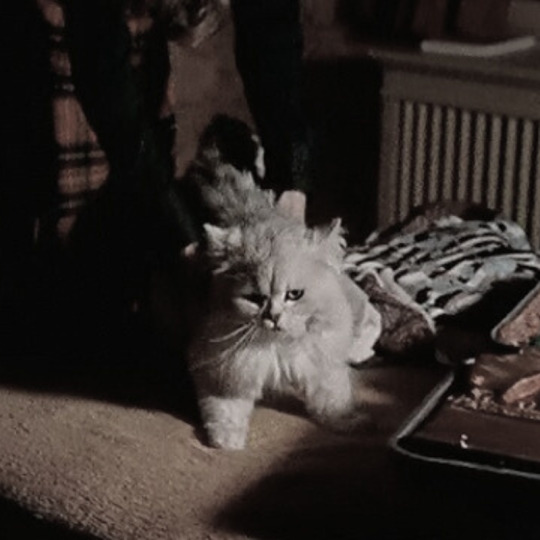


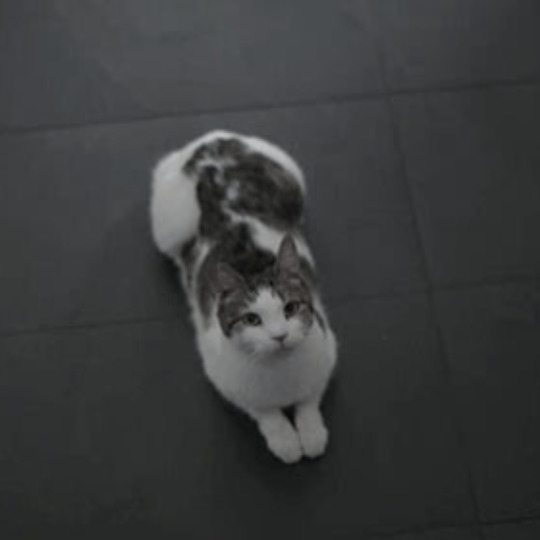
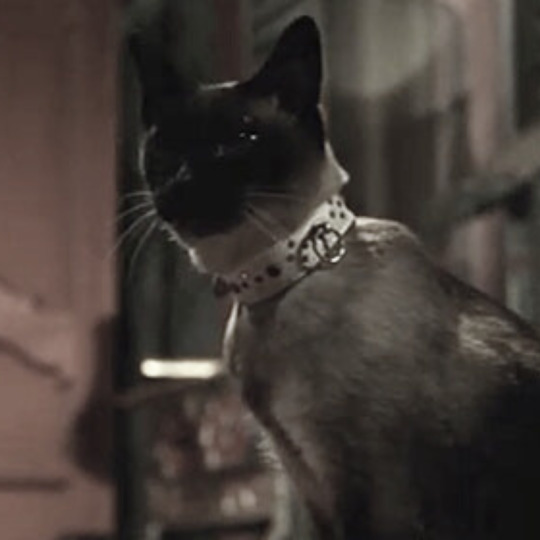

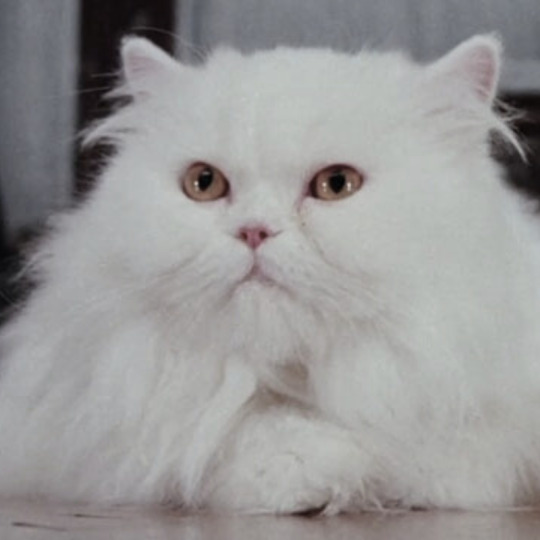
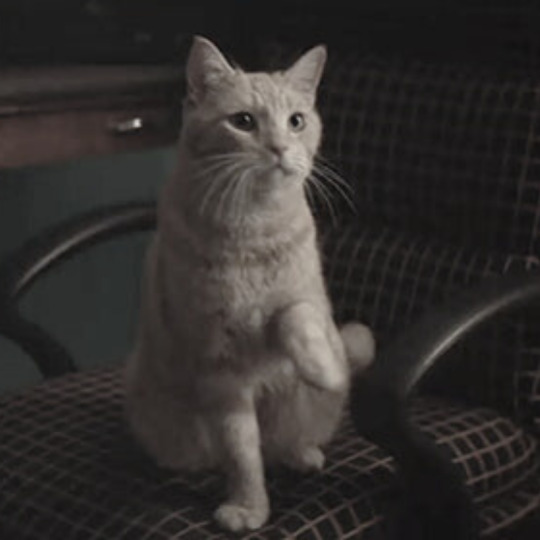
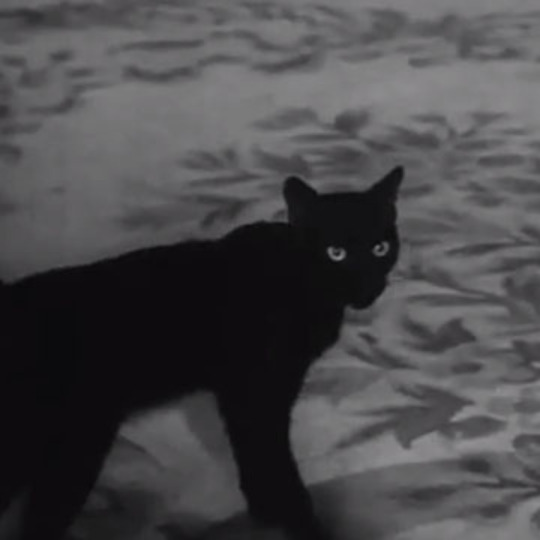



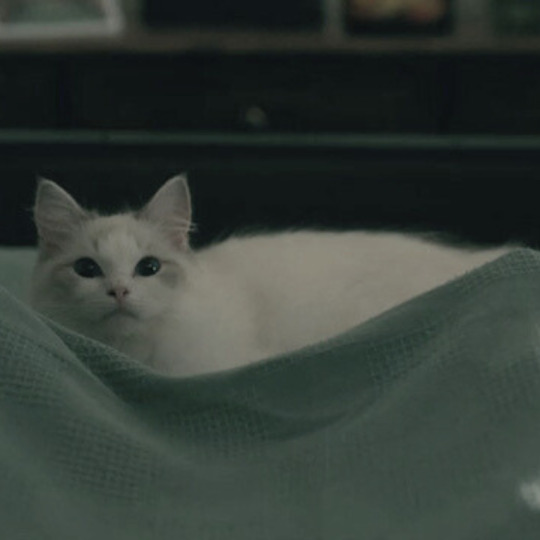



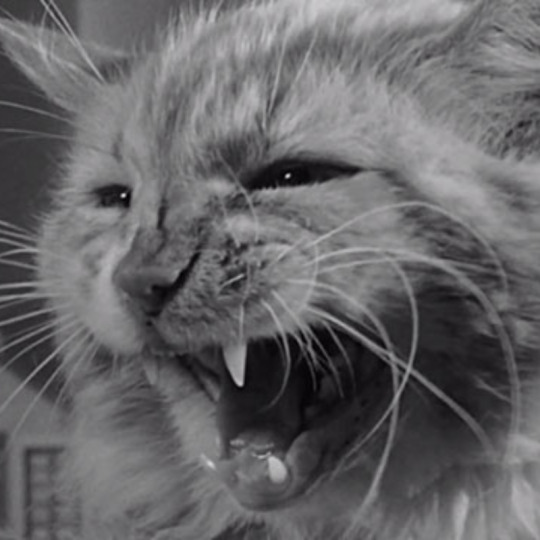
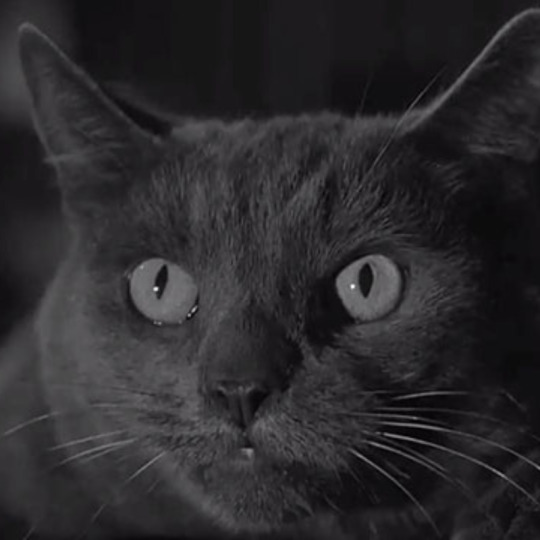

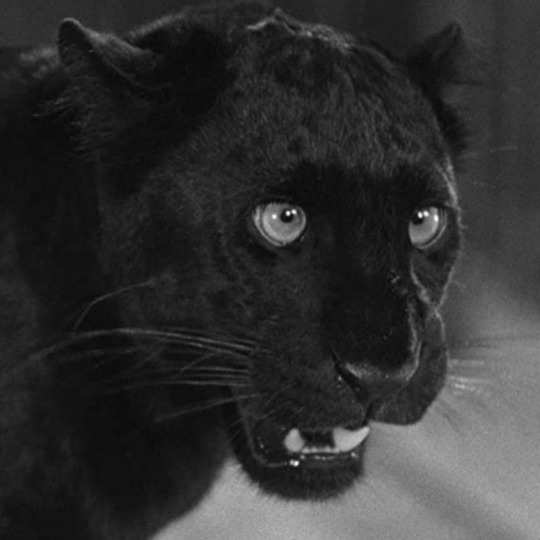
the best/questionable little (and one big) kitties in horror cinema
#blanche from hasu#winston church from pet sematary#jezebel from the sentinel#jonesy from alien#ligeia from the tomb of ligeia#thackery binx in hocus pocus#general in cat's eye#mar in ju-on: the grudge#the cat in a girl walks home alone at night#the cat from coraline#claude from black christmas#cat from the uninvited#miss kitty from may#moustache in smile#seraphine in theatre of death#mr whiskers in frankenweenie#sugar from the uncanny#giles from 1br#pluto from the black cat#satan from your vice is a locked room and only i have the key#sugar from vampire in brooklyn#pud from stitches#azreal in doctor sleep#g-spot from color out of space#stella from velvet buzzsaw#cleo from tales from the crypt: demon knight#butch from the incredible shrinking man#grimalkin from curse of the demon#pyewacket in bell book and candle#irena from cat people
490 notes
·
View notes
Text
More Jane Eyre analysis, this time concerning the Varens family backstory and my theories and opinions on the characters of Adèle and Rochester, as well as their depictions in the 1996 and 2006 adaptations--
In a post I made, I mentioned that Céline Varens (mother of Adèle Varens) was dead, and someone (@thoumpingground, thank you!) replied with how they thought Céline had just ran away with a musician and never actually been pronounced dead. This led me to wonder, because a lot of the criticism and essays I've read repeat the idea that Adèle is an orphan and/or that her mother died, and I myself could have sworn her mother died of consumption or typhus. But no! I went on the Internet Archive and re-read passages about Rochester and the Varens, did a deep reading, and came to other conclusions which totally changed my understanding of these characters. Below I try to untangle and assess this apparently common confusion.
Here are the details I've gathered: 1) Adèle tells Jane only that her mother died, 2) Rochester tells Jane only that Adèle's mother abandoned her. I originally believed that she died after the abandonment, but it seems more likely that 3) Rochester must have told Adèle that her mother died because it was easier than explaining the abandonment. 4) Neither Rochester nor Jane believe that Adèle is his biological child, and no biological father ever claimed her, making Adèle paternally as well as maternally abandoned. 5) After Rochester tells her the story of Adèle, Jane calls Adèle an orphan like herself, not because she believes Adèle's parents are dead, but because she's likening abandonment to orphaning.
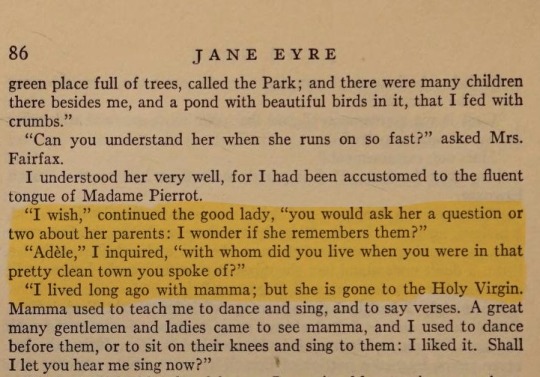
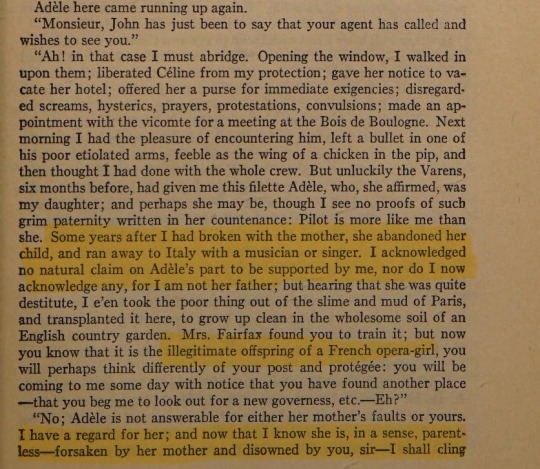
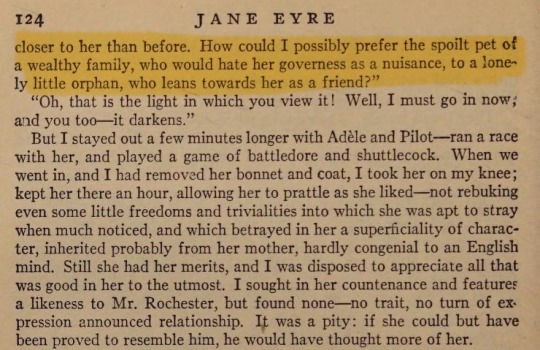
I believe that Rochester's probable lie to Adèle is fully in line with his character because the entire plot of the novel largely hinges on his repetitive deceptiveness. His love for toying with the truth, combined with his flair for the dramatic and his passionate feelings of betrayal at the hands of Céline, render it easy to believe that he would've seen Céline's abandonment and infidelity as her being metaphorically "dead" to him. As Rochester often conflates feelings and facts, and continuously blurs the lines between fiction and reality (every other line he's mentioning elves and mermaids), he wouldn't have seen him calling Céline dead as being a complete lie, and this is what makes it more believable to me.
Rochester usually believes his own lies to some extent or is able to justify them. His talent at deception a major attribute (and flaw) of his, as well as something we readers are constantly left to debate the morality of; this is made more complex by most of his lies being understandable or sympathizable, even if sometimes ridiculous. This is what makes him an appealing character.
He imitates a fortune teller on the basis of fortune telling being inherently deceptive anyway (as Jane states). He dons this disguise to break-up with Blanche while uncovering her true motives and protecting her feelings in the process, as well as to try to covertly assess the truth of Jane's feelings and to reveal his own.
He claims to be a bachelor and tries to get remarried because he felt like Bertha had already been metaphorically and spiritually divorced from him a long time ago, if not in actuality. He deceptively hides in Céline's room in order to ascertain what he already knows to be the truth and to convenienly confront her. Céline's larger deception allows him to feel that his own one is justifiable. He also deceives Jane when they first meet by failing to inform her of his identity, but he doesn't assume a false identity, either, complicating this lie as well.
He leads everyone (but most importantly, Jane) to believe he's planning to marry Blanche even after we can tell that he's really planning to marry Jane. This again is a sort of half-lie in his eyes, because he truly did plan on getting remarried to someone.
I also have a theory that Rochester really did plan on marrying Blanche before deciding to propose to Jane, considering that: 1) we're told by Mrs. Fairfax that Rochester and Blanche had flirted before Jane was in the picture; 2) Rochester says that Blanche resembles Bertha, who he said he married because he was attracted to her; 3) it wouldn't make sense that Rochester would go through so much trouble to lead Blanche on solely to make Jane jealous, especially not when we know he had set his sights on Blanche before he knew Jane and prizes constancy in affection above all else; 4) Blanche's character specifically matches that of all his other past lovers (in short, more beautiful on the outside than the inside) which supports the idea that his attraction to her and intention to marry her was actually genuine at first.
In short, all Rochester's lies are omissions or half-truths, always justifiable in his eyes because they're performed to protect himself, or others, or as a method of assessing the truth. He follows an odd set of rules regarding deception, and this is in line with the strong fae/folklore/trickster themes of the novel which many academics have noted. I don't believe he ever deceives carelessly, on a whim, or in order to be purely cruel.
Adèle informs Jane that her mother has gone to heaven, so evidently she has been told so by someone. I also believe his probable lie to Adèle is important because it is more proof that he truly does care about her beneath his reluctance to love her due to her similarity to her mother.
I can imagine Rochester sitting her on his knee and explaining this to her much like he later explains to her in the carrage of his and Jane's elvish, honey-"moon" adventure tale. Despite openly criticizing her and her mother, Rochester still doesn't want Adèle to have abandonment issues, to feel lonely, or to break her heart by ruining the good memories of her mother which she so clearly covets, as seen by her proud presentations of the song, poetry, and dance she says her mother taught her.
I don't know why adaptations haven't banked on these points, since Rochester's relationship with Adèle is one of his most redeeming qualities, even despite his occasional coldness to her. The 1996 version is great because out of all the adaptations I've seen or read about (not all of them because there are a million), it has the most emphasis on Adèle and her relationships.
1996 also keeps the line about her mother going to the Holy Virgin, and we get the impression that she was raised by her mother, whereas in the 2006 BBC adaptation for example, we're shown that Adèle was left to Rochester in her crib, yet Rochester still says Adèle inherited her mother's bad "French" attributes, which from his perspective must be genetic.
All the Rochester's question Adèle's nature v nurture attributes to some extent, but choosing to give Adèle no memories of her mother as the 2006 does kind of changes the Adèle/Céline discourse to being more genetic in basis. In other words, the 2006 focus is more on questioning nature rather than nurture, whereas other versions focus on both, or focus on nurture.
All the Rochester's speculations on Adèle's genetics keeps in line with 19-century anti-French British sentiment, and the increasing Victorian "nature vs nurture" discourse. For 2006 Rochester specifically, this all fits with his interest in biology & nature -- his specimen collection, him helping with Adèle's lessons, his scientist friend, the twin/twin flame theories; all 2006 inventions which clearly have a lot of historical and textual basis. However, in all the versions, it seems Adèle's vanity and "French defects" (as Jane dubs them in the book) whether genetically or socially imbued, exist to emphasize how nurture is just as important as nature.
Bertha Mason and John Reed exist as examples of ill nature overpowering weak nurturing, whereas Jane Eyre and Adèle Varens are examples of undecided nature strengthening in resolve after an upgrade of nurturing. For Jane this was through Bessie, Miss Temple, Helen Burns, and Mrs. Fairfax. For Adèle it was Mrs. Fairfax, Jane, and then Jane sending her to a good school which she says at the end of the book was responsible for turning Adèle into a great person.
But there is also an emphasis on the willpower of Jane and Adèle, as there is for Edward Rochester, who we learn from his account probably had poor nurturing, as he says his father and brother tricked him into marrying Bertha. As an aside: the 1996 version really emphasizes the implication that Rochester's dad and brother sucked, which I agree with, but I think it's also part of the problem of this film making Rochester a little too sympathetic (lol).
It makes sense that in the book Adèle had apparently been old enough to actually remember being socialized by her mother and therefore had been more capable of absorbing her mother's character. Perhaps 2006's approach is more intelligent, as it leaves the theory of nature v nurture more up for debate just like Adèle's parentage is (though Jane and Rochester are decided against his paternity, we have no way of ascertaining it).
I wish we had been able to see or hear more about Céline interacting with Adèle, as it would have explained how Adèle came to love the performing arts and to worship fashionable ladies. In the book, this is essentially her clinging to memories of her mother, which are later replaced by Jane's influence.
Adèle's status as an orphan (if not a literal one, a metaphorical one) is worthy of analysis because it also links her to the (literally) orphaned Jane and Rochester. Their mutual orphanage leads them to bond and form into a found family. Jane blatantly declares this kindredness to Rochester as highlighted above, and I believe Rochester must also feel this connection as shown by his devotion to Adèle, as he explains he took her on because she had no one else in the world (except Sophie maybe, but she couldn't support Adèle alone).
#my analysis#jane eyre#adele varens#charlotte brontë#the bronte sisters#celine varens#mr rochester#literature#english literature#analysis#literary analysis#blanche ingram#opinions#theories
66 notes
·
View notes
Note
MR AND MR SITH I LOVE IT!!!😭😭😭
I’m just picturing them doing the Angelina and Brad pose and it’s sending me
ok i was thinking about this au this morning so here is 1.1k of a writing warm up set in the mr and mr sith au where the jedi have captured master skywalker to take him home (they think he's been held hostage this entire time), but they accidentally pick up sith obi-wan instead and no one is prepared........
(1.1k)
Ena frowns down at Jedi Master Anakin Skywalker, a bad feeling sprouting in her chest. This all feels wrong, but it isn’t. She knows it isn’t.
“He really fought back?” she asks Mal as soon as he enters the room. “But you told him we were Jedi, right? That we came to rescue him? That he was safe?”
Mal puts his hand on her shoulder. The touch is supposed to be comforting, but Ena isn’t sure how much she wants comfort right now. “I did,” he swears. “But he’s been held captive by the Sith for so long, Ena, who knows what they’ve done to his mind?”
“He doesn’t…he doesn’t look tortured,” Ena says, looking over Master Skywalker’s bound figure. They’d had to physically tie him down with rope and chain once they’d subdued him, apparently. Apart from the livid bruise along his cheekbone, he appears uninjured. His hair—auburn and rather short—falls messily over his face.
“You and I both know that sometimes the deepest scars are ones we cannot see,” Mal tells her, squeezing her shoulder once.
“And the child?” Ena asks. “Has the med droid finished looking him over?”
“Healthy,” Senaka reports as she comes into the room, montrals twitching at the change of Force, a heaviness in the air that they know comes from their captive even though they’re not sure why. “Five standard years of age, I believe, with a ridiculously high midichlorian count. He’ll be waking up within the hour, I’m sure.”
“Master Skywalker has clearly bonded with the boy,” Mal reports, hand rising to tug at a padawan braid that’s no longer there. “It was only when we separated them that he stopped fighting us. He didn’t even notice Senaka had a force collar until it was already on his neck.”
Ena feels a headache brewing behind her eyes. She knows what they’ve done is the right thing.
It doesn’t feel right though.
To tie a venerated, traumatized man to a chair, to win a fight against him by subduing a child…but they had had no other option.
After six years of no information, the Jedi Council had finally caught a whisper about Jedi Master Anakin Skywalker’s location. Four Jedi Knights had been dispatched to follow this rumor to its bitter end, to track down Master Skywalker, rescue him from the clutches of the Sith who stole him away so long ago, and bring him home.
Their informant had confirmed that a man with yellow eyes was often seen on the same planet, in the same city. So they’d had to move fast.
And when Master Skywalker had not been receptive…when he’d killed Knight Avas…Ena knows they’d been forced into making a decision that felt wrong but must be right.
Mal squeezes her shoulder once, opening his mouth to say something. Before he can, Master Skywalker shifts slightly in his chair before he freezes completely. Awake.
His eyes flash open a second later, pale blue glowering right into Ena’s soul. “Where is he?” he spits, words spoken in an unexpectedly Coruscanti accent. “What have you done with him?”
“Master Skywalker,” Ena says, holding out a hand to try and soothe the fury thrashing in the man’s eyes. He snarls the moment she comes too close. “The boy is fine. I swear it, you know the Jedi would never hurt a child. We won’t hurt you either. It’s over. You’re safe.”
Master Skywalker rears back as much as he can in his current position. “I want to see him,” he commands. “Bring him to me.”
“We can’t do that,” Senaka shakes her head slowly. “You’re…volatile, Master. You could hurt him.”
“You will let me see my child,” Master Skywalker snaps, voice seeping with danger. “I—”
It is the patter of little feet that interrupts him now, and the three Jedi turn around immediately. Not before there’s a blur of movement from the door and the boy careens between their legs, running to throw himself onto Master Skywalker’s lap.
Though the man’s arms are bound tightly behind him, Ena can see the way he automatically tries to hold the boy, shoulders jerking forward before he sinks back with a snarl of frustration.
“Papa!” the boy is saying over and over again, rubbing over the Jedi Master like an affectionate tooka cat. “I can’t feel you! Papa, why are you gone?”
“I’m here, Luke, it’s alright. We’re alright,” Master Skywalker murmurs, voice becoming impossibly softer as he leans far enough down so that he can tap their foreheads together.
“Master Skywalker, we mean you no harm,” Ena tries to say, taking another step forward. Senaka is right. Master Skywalker killed a Jedi only a few hours ago. He’s unstable. He’s dangerous.
“I don’t know who that is,” the man snaps as the child—his child?—hides his face in his neck. “Release me at once. I have no ties to the Jedi Order.”
“What?” Mal looks shocked then shaken. Ena understands. None of them ever knew Master Skywalker, but everyone in the Temple had heard of him. He was legendary. A perfect Jedi. To hear that he doesn’t even recognize his name…it shakes Ena to her core. “No—you—you are Master Skywalker. Do you—Anakin. That’s your name. Anakin Skywalker. You’ve been missing for six years. You were kidnapped by the Sith on an undercover mission to Nyrel. We never stopped looking for you.”
The man in front of them freezes again, face expressionless as the seconds tick on. Slowly, a red eyebrow arches its way up his forehead. “Oh,” he says like he’s suddenly realized a great mystery of the universe. “Oh, I see.”
The child on his lap tugs at the front of his robes before deciding to tug at the bristles of his beard instead. “Papa,” Luke says in that way children do when they are demanding attention. “I can feel Daddy though. He’s not feeling good.”
Skywalker’s nostrils flare at this, and he cuts his eyes from the far wall down to the boy and then up to Ena. “Did you hurt him?” he demands, voice like ice. “When you captured me. Did you hurt him?”
“The boy? No—you can see, he’s fine—”
“A man,” Skywalker shakes his head. “Golden hair. Blue eyes. Tall.”
“No, papa,” Luke tugs at Skywalker’s beard again. “No. He’s okay. But he’s not feeling good things.”
Skywalker’s attention is fully on his child. “What do you mean, Luke?” he asks, voice gentle and coaxing.
“Angry,” Luke says. “Daddy is angry and close.”
For some reason this makes Master Skywalker smile, lines around his eyes crinkling with the force of his joy. “That’s very good then, Luke Love. Do you know why?”
Ena feels Mal shift next to her, unease growing in the air around them as Master Skywalker turns his face up to them. “Why?” Luke asks.
“Because our friends here really want to meet your daddy,” he says. “And I think your daddy’s going to be absolutely charmed.”
#asks#mr. and mr. sith au#obikin#i imagine when anakin comes aboard he probably darth vader at the end of rogue one's the three jedi#and then carefully cradles obi-wan's face in his hand and does the who did this to you (about the bruise)#and obi-wan is like your old jedi colleagues#and anakin blanches because obi-wan knows now......cover blown#life over#etc etc#no i dont think obi-wan would then come clean about being a sith tho#the moment would have to be right
178 notes
·
View notes
Text
BACKROOMS DESIGNS FOR SOMETHING UPCOMING!! (Not soon though)



BLANCHE, EULICITY THE PARTYGOER, AND MR KITTY/“FELIX” IN THIS AU
#the backrooms#backrooms#blanche#partygoer#mr kitty#blanche backrooms#the backrooms blanche#the backrooms fandom#level 974#backrooms library#level fun#=)#=]#the frontrooms#backrooms archive#au#original au#backrooms au#art#designs#redesigns#redesign#au design
21 notes
·
View notes
Text
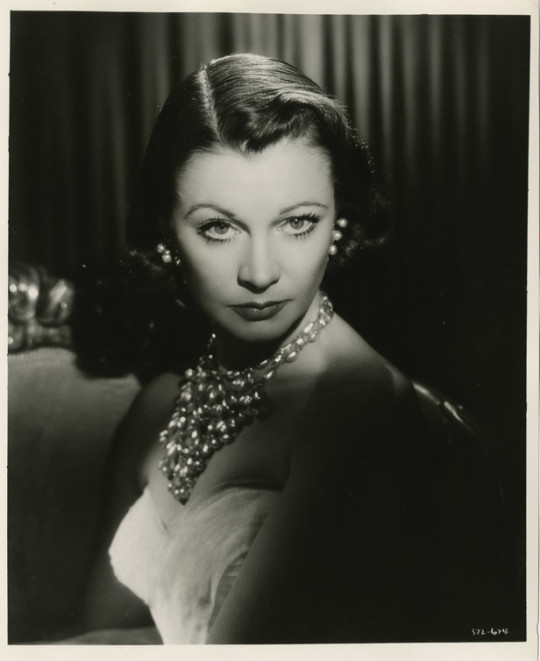
“In the Soviet Union they considered Vivien Leigh as the greatest movie star of them all and Waterloo Bridge (1940) as one of the great films of all time. In America, they gave her the plum role of Scarlett O’Hara in Gone with the Wind (1939) and two Academy Awards. In England she was mainly the wife of Laurence Olivier, the world’s greatest stage actor – no wonder she made so few films and had such an odd movie career. She made ten films before Gone with the Wind, ambitiously acquiring a reputation, and worked in only eight more after that epic made her world-famous – admittedly she suffered from ill-health and considered herself primarily a stage actress, but it does seem as if a fine screen talent was semi-wasted … Her movie persona was a fascinating one. Despite her incredible Dresden doll beauty, she was one of the cinema’s great not-very-nice ladies; not quite the bitch type, more the unscrupulous, wily, kittenish beauty who uses sexual attraction as a weapon to get her own way. The role of Scarlett was the greatest embodiment of this seemingly unsympathetic but actually mesmerizing personality, but virtually all her roles were this type.”
/ From The Illustrated Encyclopedia of The World’s Great Movie Stars (1979) by Ken Wlaschin /
Born on this day 110 years ago: brilliant, fragile and intense English stage and film actress Vivien Leigh (5 November 1913 - 8 July 1967). Alongside Anna Magnani and Elizabeth Taylor, Leigh was one of the screen’s definitive interpreters of Tennessee Williams’ work (my all-time favourite performance of hers is in The Roman Spring of Mrs Stone (1961)).
#vivien leigh#tennessee williams#scarlett o'hara#blanche dubois#the roman spring of mrs stone#lobotomy room#british actresses#british actress
32 notes
·
View notes
Text
BUM
#golden girls#rose nylund#dorothy zbornak#blanche devereaux#sophia petrillo#betty white#bea arthur#rue mcclanahan#estelle getty#mr sandman#the jams#it's Dorothy's bass voice that really sells the whole thing
28 notes
·
View notes
Text
Letters From Watson Liveblog - Dec. 6
The Blanched Soldier, Part 3 of 3

Godfrey's no good, very bad day; from getting shot, crawling through the freezing cold, only to wind up in a leper's bed of all places.

Leprosy is one of those things I've heard of but have never really learned about. Seems like lepers were treated quite harshly then based on what Godfrey's putting himself through.

What a miracle of a happy ending. I suppose it's nice, though a bit too convenient. Overall, another fine story elevated by the fact that Holmes is the one narrating and Watson's absence is decidedly felt throughout it.
Part 1 - Part 2 - Part 3
#letters from watson#the blanched soldier#sherlock holmes#john h watson#godfrey emsworth#colonel emsworth#mrs emsworth#ralph the butler#mr kent#james saunders#arthur conan doyle#liveblogging sherlock holmes
6 notes
·
View notes
Text
Omg in the bucket job Mr Blanche is reading Bonanno's book 🤣 I'm dead
3 notes
·
View notes
Text
i’m watching golden girls :))
#slightly in honor of crowley#slightly because it’s the only good thing playing on the TV of the house i’m staying in#i love rose haha#oh and dorothy she slays#rn they’re singing mr sandman to a baby this is great therapy#and blanche ofc#golden girls#good omens
3 notes
·
View notes
Photo

Bad movie I have Dr. Jekyll and Mr. Hyde 1920
#Dr. Jekyll and Mr. Hyde#Paramount#John Barrymore#Brandon Hurst#Martha Mansfield#Charles Lane#Cecil Clovelly#Nita Naldi#Louis Wolheim#Alma Aiken#J. Malcolm Dunn#Ferdinand Gottschalk#Julia Hurley#Jack McHugh#Georgie Drew Mendum#Blanche Ring#May Robson#George Stevens#Edgard Varèse
2 notes
·
View notes
Text
"One of the Branches": E.P.W. Packard, Libby, Mental Health, and Barbara Sapinsley's clever storytelling
A compilation of three images I posted on Instagram back in mid-September 2023, of this book, before I began reading it. At the time, I wrote “it just arrived today: the first (I think) scholarly book on my #ancestor Elizabeth P.W. Packard, which came out in 1991. While there have been two other history books focused on Elizabeth since then (by Linda V. Carlisle and Kate Moore), this book by…

View On WordPress
#Abijah Cole#abolitionists#asylums#Caroline C. Stillé#Chicago IL#child rearing#Civil War (1861-1865)#Civil War Era (1849-1865)#Cook County#court cases#death#divorce#Elizabeth "Libby" Ware Packard#Elizabeth P.W. Packard#estrangement#Gilded Age (1870-1900)#Hannah Webster Packard#Jacksonville Developmental Center#Kanakee IL#Kankakee State Hospital#Los Angeles#Lyons NY#Mabel Blanche Packard#Manteno IL#Marital power exemplified in Mrs. Packard&039;s trial (1867)#marriage#mental health#Modern persecution or Insane asylums unveiled (1874)#New York City#Packard descendants
0 notes
Text
jane eyre 2006 fans: in ep 3 toward the beginning, what is your interpretation of the scene with rochester and blanche ingram where she talks about renovating the furniture and he intently asks her "what do you rly want, blanche?"
having rewatched the series more than once, it feels more and more awkward/out of place as an addition - like there were probably deleted scenes or something that got cut out. it just doesnt seem purposeful at all. because before that, we see rochester admitting to having the fortune teller upset blanche - and after that, we see him part ways with the ingrams, giving her mother a death stare. so what did blanche tell him!!!! because i highly doubt she confessed to being a gold digger, and upon further analysis, she just seems annoyed in most of their scenes together and doesn't even seem to be into him at all. it's her mother doing everything.
and upon further consideration i honestly get the vibe that maybe she told him she didnt want to get married at all lol and that may be why rochesters attitude seems more directed at the obnoxious mrs ingram. anyway, blanche's prolonged silence and coyness in that scene is increasingly perplexing to me although i thought nothing of it upon first watch. maybe I'm just overthinking. idk what the director was going for there.
i also notice that aside from two or three snide comments, she really is a normal lady with a horrible mother lol - when everyone freaks out over mason's screaming, she takes initiative in asking what the hell is going on. she's the best female rider in the county supposedly. she shows courage at the ouija game. i don't really buy that 2006 blanche was really that devious or in love with rochester, but just a lady being practical & trying to please her mom. anyway!
#jane erye#jane eyre 2006#blanche ingram#any blanche stans wanna chime in#blanche is a lesbian truthers where are you#from various posts/essays/fanfiction i've read i know at least 3 of u exist#mr rochester#analysis
17 notes
·
View notes
Text
listening to frank sinatra's cover of its only a paper moon whilst doing homework on parallels between a streetcar named desire and feminine gospels and feeling like bawling. how we feelin
#MRS MACKAY AND BLANCHE........DEATH AND DESIRE...#BOTH UNDER THE UNREACHABLE MOON#AUCUJGGKKGKG#not equipped for rambling
0 notes